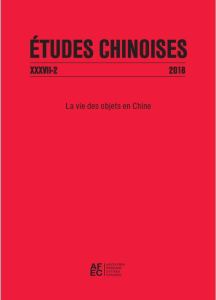
PREV ARTICLE
NEXT ARTICLE
FULL ISSUE
PREV FULL ISSUE
NEW ARTICLE: THE FORGER AND NUMISMATISTHelen Wang, Curator of East Asian Money at The British Museum also discussed a new article by by Lyce Jankowski 19th century Chinese collectors and forgers. -Editor
"What lengths the forgers go to! They produce items as large as yi and ding vessels; and as small as coins." These are the bitter facts that greet the reader on the first page of Guanguge quanbian (Identifying the coins from the Guanguge), a pamphlet from 1873 which deals exclusively with the question of forgeries. Written by the eminent numismatist and collector Bao Kang (1810-1881), it gives the names of several forgers of the Xianfeng and Tongzhi reign periods, and details of their particular techniques. These forgeries, aimed at collectors, circulated through the hands of antique dealers. We learn that some dealers availed themselves of the services of forgers. For example, the brothers Su Zhaonian (dates unknown) and Su Yinian (dates unknown) in Chang’an worked together with a certain Zhang Erming (dates unknown). The manufacturing techniques varied, and some were more sophisticated than others. The simplest method was to make casts of existing coins; but sometimes an old coin might be given a new inscription, and some fantasy pieces were created too. One forger in particular attracted great attention. He was Li Baotai ??? († ca 1875), who earned the respect of the most important collectors of the time—Liu Xihai (1793-1852), Ye Zhishen (1776-1861), Li Zuoxian (1807-1876), Chen Jieqi (1813-1884), and Yang Jizhen (1820-1901) —who called on his talents at making rubbings and entrusted him with their private collections of coins. They even bought old coins for him, although they were aware of his forgery business. The quality of his rubbings rendered him indispensable to them and at the same time afforded him direct access to rare pieces, which he could copy at leisure. The relationships between the collectors and forgers were thus ambiguous. Bao Kang frequently met with the forgers, whom he named, and whose skills he acknowledged. The sale of such forgeries did not worry him as much as the possibility that they might be published by collectors who did not know better. To read the complete article, see:
 Wayne Homren, Editor The Numismatic Bibliomania Society is a non-profit organization promoting numismatic literature. See our web site at coinbooks.org. To submit items for publication in The E-Sylum, write to the Editor at this address: whomren@gmail.com To subscribe go to: https://my.binhost.com/lists/listinfo/esylum All Rights Reserved. NBS Home Page Contact the NBS webmaster 
|
